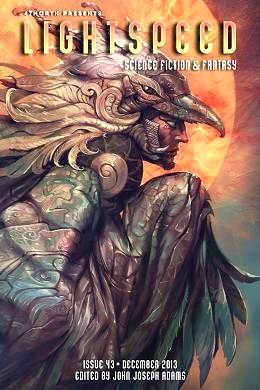Reviewed by Louis West
Gregory Benford’s “Leaving Night” is broken into three sets of scenes, each presenting a different perspective of the same event. Leaving Night: During one random 24 hour period, all intelligent entities on Earth with strongly held beliefs suddenly disappear. This includes over a billion people with a wide variety of faiths, various animals, including elephants and crows, and atheists, for they can believe strongly in the absence of a god. The world endures chaos and hardship for a time as people try to sort out the whys of the event and get their lives back together. Eventually, though, a new renaissance dawns, and humankind pushes out into the solar system and then to the stars. Imagine their surprise when they finally land on a suitable extrasolar planet and discover the descendants of all the people who had been taken during Leaving Night. Except, for them, being transported to a different world had been even more traumatic, for none of their technology had gone with them. Then we learn what really happened that long-ago night and that “God” does have a sense of humor.
An intriguing metaphysical exploration of a perplexing event and humankind’s diverse interpretations of it. Recommended.
“Invisible Planets,” by Hao Jingfang, is an homage to Calvino’s “Invisible Cities” (quoting the author from her interview with Lightspeed). And I would agree. The style and form are similar—short vignettes about each place describing the people and a unique aspect of their culture, with occasional interjections between narrator and listener. It’s irrelevant as to whether or not the places and peoples are real, as amusing as some are. What’s ultimately important are the ties created between teller and listener by means of sharing stories. Pleasantly entertaining. Recommended.
James Patrick Kelly’s “Miss Nobody Never Was” follows an alcoholic bar owner, Chaz, as he struggles to free himself from the baggage of a bad divorce and a business that’s stealing his life from him. Enter a ghost, more precisely the spirit of Adele, the woman his wife used to be when he’d fallen in love with her. She’s real—Chaz can touch her—and she demands, “You broke her, so you fix her,” referring to the current, alcoholic, still living Adele, proclaiming, “I don’t want to be her.” An excellent tale, full of twists and tension as the spirit of the young Adele intervenes in not just Chaz’s life but also her once best friend and the broken person Adele finally became. And the story’s end? Refreshingly surprising. A definite read.
“The Correspondence Between the Governess and the Attic,” by Siobhan Carroll, is Jane Eyre told in short, succinct scenes with a fey twist. Jane, as she has taken to calling herself, is a changeling, a fey in human form, orphaned young, raised hard but eventually becoming governess at Thornfield to a wild child, Adele. Jane senses the darkness in the attic at Thornfield and even exchanges a few notes with it trying to discover its purpose, but to no avail. Over time, she learns to love Adele’s father, for, in his rough way, he has treated her kindly. Then he reveals his great secret—his fey wife, mad now, is imprisoned and raging in the attic. Jane flees to find refuge among three other changelings, who don’t know what they are—an impoverished brother, chained by his drive to seek God, and his two cowed sisters. But the attic calls her back to Thornfield, and Jane returns to find the estate burned to the ground. She also learns that she’s become “Jane, Heir” due to a sudden windfall from a relative in the West Indies. At this point she decides “it is time for a new kind of story” and finally realizes her own fey powers, choosing a life of her own making as an independent woman.
A unique telling of an old classic. Recommended.
 Lightspeed
Lightspeed